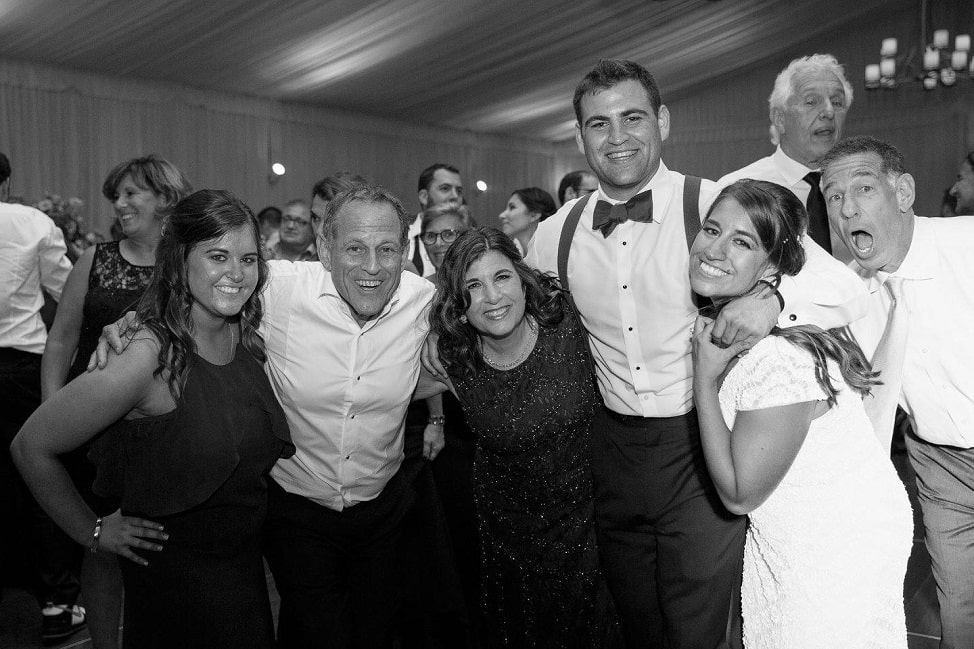
Congratulations! Mazel Tov! Your son or daughter is getting married. Your family is growing. Hopefully, with the help of your financial advisor, you have already been planning for the big day. A lot has changed in weddings over the years and, as you can guess, the most significant change is the cost. The average wedding with 100-150 guests costs well over $35,000. And if you live in certain regions of the country (you know who you are), that number is even higher. So, how do you financially plan and budget for a wedding?
The Whole Sum: Who Contributes?
First things first, who is paying for this wedding? It is not uncommon for the families of the bride and the groom and the lucky couple to all contribute to the cost. These conversations can be awkward but are worth having, and having them early on in the process is best. Not all parties are willing and able to contribute, and that must be respected.
When our daughter got engaged, my husband and I, with the help of our financial advisor, already had a realistic figure in mind that we could contribute. The groom’s family also wanted to help fund the cost of the event. Once the couple had that total amount, all agreed that any additional expenses would be paid for by the bride and groom. This worked out well for all of us and was a great learning experience for the young couple.
Because they had some “skin in the game,” the bride and groom made prudent financial decisions. We all know it’s a lot easier to spend someone else’s money. They carefully evaluated each expense. Was it worth hiring the ten-piece band or splurging on the elaborate floral centerpieces? It was a great lesson for them in negotiating, compromising and budgeting.
Saving or Raiding the Coffers?
If you need time to save your portion, is the time frame achievable? If you are using existing savings, are you comfortable depleting that amount of money on a one-day event? It is not only what you can afford but also what you want to do and what value it has to you. For some people, spending tens of thousands of dollars on a one-day event seems too indulgent and frivolous, even if their bank account can easily handle it. For others, making a dream wedding come true means the world to them.
Create Your Wedding Spending Plan
Now that you have a good idea of how much money there is you can start building a specific budget. Often the cost of a wedding is based on guest count. It is the single biggest influencer of the total expense. Almost everything revolves around the number of guests. It determines the size of the venue, amount of food, alcohol, table centerpieces and invitations to name just a few.
Decide what your top priorities are and then “spend” your budget accordingly.
For some, the priority is the band. To others, it’s the food or venue. List your top priorities and rate their importance. Is there something that is non –negotiable? For my daughter, finding a great band and offering an open bar were imperative.
Identify those items and budget accordingly. We used a spreadsheet to compare different venues, bands, photographers and other items. Do some research and be prepared for some serious sticker shock. Once you are breathing again, you might want to revisit your budget and your priorities.
Smaller Expenses Add Up
Often wedding budgets get blown because of surprise expenses. We were so focused on the big items that we neglected to budget for the smaller ones which added up rapidly. Some of those expenses were: the morning-after brunch, after party, welcome bags for hotel guests, upgraded chair rental, officiant, music during the ceremony, day-of wedding planner, hair and make-up and tips.
Negotiate
One more piece of advice- everything is negotiable. The vendors want your business and want you to be happy. Don’t be afraid to bargain. You might not reduce cost, but you may be able to get more for your money. And if something is truly over your budget move on to another vendor that is more in line with your price range. The wedding industry is booming, and there is a lot of competition for your business.
Once decisions are final, make a schedule of expenses leading up to the wedding, so you’ll know when funds are needed and how much.
Here are some helpful links to get you started: Wedding Wire, The Knot, Real Simple.
Keep this in mind: your event will be beautiful and special mostly because of you. Relax, enjoy and have a great time!
Now that that’s done, let the dieting begin.